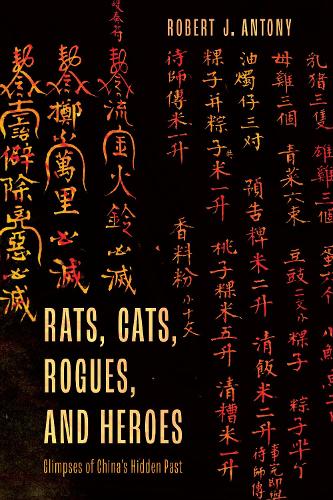
Rats, Cats, Rogues, and Heroes: Glimpses of China's Hidden Past
(Hardback)
Publishing Details
Rats, Cats, Rogues, and Heroes: Glimpses of China's Hidden Past
By (Author) Robert J. Antony
Bloomsbury Publishing PLC
Rowman & Littlefield Publishers
30th January 2023
United States
Classifications
Tertiary Education
Non Fiction
364.951
Physical Properties
Hardback
378
Width 159mm, Height 237mm, Spine 27mm
703g
Description
History has many untold stories. In Rats, Cats, Rogues, and Heroes the author provides glimpses into Chinas hidden past through the natives point of view. Rather than simply writing about ordinary people, this book is written from the perspective of ordinary people, how they told their own stories about themselves, their communities, and their pasts. The author examines historical consciousness as revealed in peoples everyday lives and as expressed through customary rituals, sociocultural conventions, language, and the complex symbolism of common human experiences. The focus is on ethnic groups and individuals who have been routinely discriminated against in mainstream society and treated by officials as rogues and criminals. They were denizens of the underworld of rivers and lakes (jianghu), a sociocultural category that includes bandits, sorcerers, conmen, and prostitutes. To get at their silent history the author spent decades conducting field research in rural areas of southern China, collecting rarely used unconventional sourcesfolklore, legends, myths, rumors, and hearsaythat reveal nuggets of new information and insights not found in the conventional sources in libraries and archives. This book challenges many commonplace assumptions about how academics write history by offering alternative possibilities for Chinas past.
Reviews
Robert Antony's new book, Rats, Cats, Rogues, and Heroes, is a welcomed addition to the historical literature on the waterways and coastal subcultures of south China. Antony uncovers aspects of ordinary people's lives that dynastic histories ignore, including the trials and tribulations of business and commerce on the edge of empire. -- James L. Watson, Harvard University
Chinas historical record is dominated by sources written by a tiny group of highly educated Chinese men. Even when historians have tried to write about less elite groups, their work has been unable to escape this elitist perspective. In this book Robert Antony successfully breaks through the porcelain ceiling that is formed by these elite sources of classical Chinese history by descending deep into the sea of local sources and oral histories. When we use these sources in order to peel away the prejudices of the political elite in the established literature, the marginal people studied by Antony reveal themselves to be made of flesh and blood, no better and no worse than the elites who despise them. It is only the brush of the powerful that has made those of the past into rogues and criminals, and one can only hope that more historians like Antony will take the trouble to study these groups in an anthropological approach. And I use the word trouble on purpose since it does take an effort to travel the countryside and find these sources tucked away in the land and waterscape. -- Barend J. ter Haar, University of Hamburg
Wizards, python robes, and bad booksRobert Antonys remarkably entertaining study reveals the seedy world of danger lurking below the staid surface of social control. If you want to understand why generations of China's rulers seem to fear their own people, read this book. -- Thomas David DuBois, Beijing Normal University
Author Bio
Before his retirement in 2019, Robert J. Antony was distinguished professor and senior researcher at Guangzhou University. He is the author of Like Froth Floating on the Sea: The World of Pirates and Seafarers in Late Imperial South China (2003), Unruly People: Crime, Community, and State in Late Imperial South China (2016), and The Golden Age of Piracy in China, 1520-1810: A Short History with Documents (2022). He now lives with his wife near Princeton, New Jersey.
